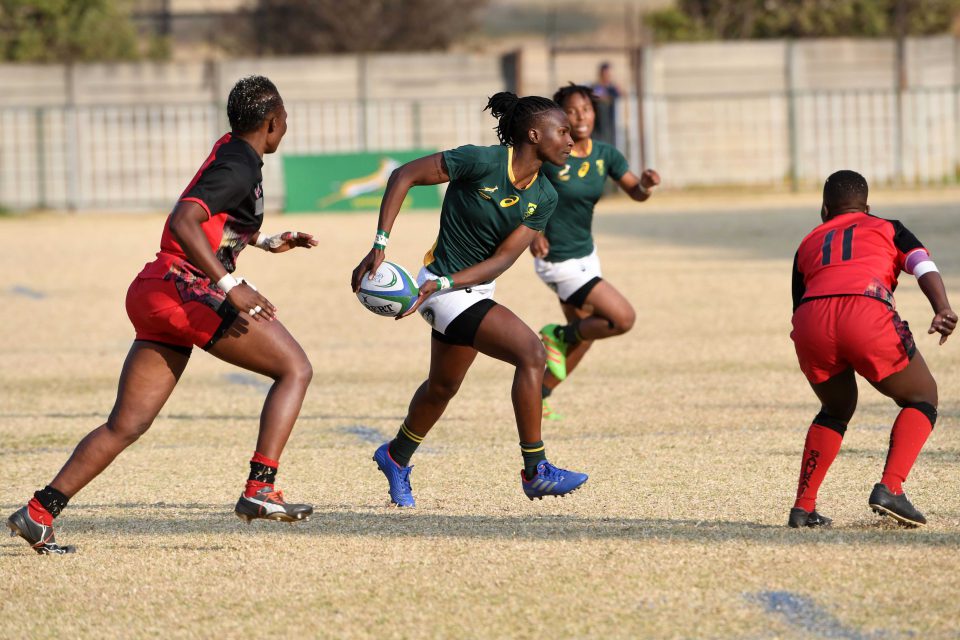Rugby on the up in Africa
The second-biggest continent will have only South Africa and Namibia at this year’s Rugby World Cup. But Rugby Africa president Khaled Babbou will not fight for more slots; his eye is on the future…
Author:
17 August 2019

For the first time in its history, the Rugby World Cup will not be hosted in one of the game’s traditional centres of power. England, Australia, New Zealand and South Africa have all been entrusted with rugby’s past showpieces, but in September Japan will become the first Asian country to host the tournament.
It’s a move that reveals World Rugby’s desire to diversify, and no doubt leverage its commercial muscle by taking the game to parts of the world it has ignored for too long.
These are early days filled with promise in rugby’s new realignment, but there is at least a move in the right direction. The sport has increased its global fan base by 24% since 2013, mainly as a result of significant growth in Asia, North and South America, and Africa. Rugby’s popularity mirrors the growth of cricket around the world; rugby supporters are getting younger and the game is attracting more female fans, while the shortened format – Sevens Rugby – has been a key pillar supporting the game’s expansion.
Related article:
Since the inclusion of rugby in the Olympics in 2016, countries such as Brazil, China, India, Mexico and the United States have increased their fan base by more than 50%. These lofty statistics point to a future for rugby that feeds into World Rugby’s need to remain profitable.
The governing body has recognised the need to promote the game beyond its traditional base and break boundaries, not only out of a need to evolve but also for self-preservation. India and China remain the fastest-growing economies in the world and the opportunity for World Rugby to package its product to billions more people is proving irresistible.
Related article:
Weeks from now the Rugby World Cup will showcase some of its best teams. Khaled Babbou, the president of Rugby Africa, will be there, monitoring the impression Africa makes on the global game this year along with assessing what they could do in years to come. More African teams in the World Cup perhaps? A North African host of the Rugby World Cup?
Africa makes up a significant portion of rugby’s global growth spurt, although lucrative ventures like World Cups (outside of South Africa) may still elude the continent for a while. Asia’s fan base of 112 million currently eclipses Africa’s of 32.7 million. However, there is potential for Africa to grow the game in its 38 member countries, which could lead to staggering numbers.
Making rugby accessible to all
World Rugby chief executive Brett Gosper, during a recent Rugby World Cup Trophy Tour in India, explained the mission. “World Rugby is committed to ensuring a thriving, growing, inclusive game that is accessible to all … that is effective in attracting a new, younger audience in non-traditional rugby nations, despite huge competition for eyeballs and attention.”
World Rugby’s Impact Beyond Legacy programme prematurely reached one million participants in Asia, a “game-changer for rugby both in Asia and around the globe”, according to the governing body.
Japan 2019 will unleash nearly $2 billion (about R30 million) into the Japanese economy, creating around 25 000 jobs. The island nation has the fourth-largest number of rugby union players because the game has been entrenched in the Land of the Rising Sun for more than a century.
Related article:
Many countries in Africa have only recently adopted rugby, while for others rugby is as old as colonialism – literally. Rugby has been played in Namibia since 1916, when it was first introduced by soldiers from South Africa who had invaded the then German-run colony.
Kenya, Tanzania and Uganda have a shared history of rugby in the Great Lakes Region dating back to the 1950s and colonial rule. The first official match between Uganda and Kenya took place in 1958. The three countries have relied on each other to play international matches, develop club leagues and share resources. Uganda is said to have a rugby-playing population of 22 000.
Zimbabwe’s rugby history dates back almost as far as South Africa’s. Then Rhodesia, it enjoyed an era of competitive international rugby in the mid-1970s. The sport has largely followed the fortunes of Zimbabwe’s economy in recent decades, though it remains more competitive in the sevens format.
Africa’s opportunity
With World Rugby’s focus on India, China and the US, Africa may need to wait its turn – unless the continent’s administrators can rise to the challenge of being overlooked and denied some of the spoils of the game.
Fortunately for African rugby, its president is a patient leader. Babbou expects no miracles performed overnight, no magic wand to be waved and no favours to be asked from the outside world. He’s prepared for the long road to transformation and is placing his vision in the hands of the youth playing rugby across the continent.
“My priority is that all young Africans and young women touch a rugby ball. Most importantly, it is not the elite, although it remains important and must exist. But young Africans are the priority. In 10 years we must have youth teams that are able to compete globally,” Babbou said in a recent interview. “I would rather have young people able, in 10 years, to compete with nations like Germany, Romania, Canada or Hong Kong, and who can then join the world elite among seniors.
“At that moment, World Rugby will look at our continent and say we must put more resources in Africa or give more places to African teams in the final phase of the World Cup,” he continued.
Related article:
The competitiveness of the Springboks in the south of Africa has flattered the state of rugby on the continent.
South Africa and Namibia will be the only African representatives in Japan 2019. Europe is represented by eight countries, along with two from South America and three from the Pacific Islands. Australia and New Zealand make up the rest. Babbou’s plan is to correct this imbalance, but he acknowledges it can’t happen in an instant or without a long-term strategy.
“I will not fight for the senior Rugby World Cup. But I will fight for the Under-20s. A team competing in the World Cup, like the 2019 edition in Japan, needs a lot of money for the tournament. I estimate this need at €3 million or €4 million [about R50 million to R70 million]. However, no federation in Africa has these means. I therefore prefer to invest money in the federations at the Under-20 level. In this category, we will be able to obtain results, whether with Algeria, Nigeria, Cameroon, Kenya, Zimbabwe, Tunisia and Morocco,” Babbou said.
Related article:
Babbou fell in love with rugby when he was eight years old, while attending a French school in Mutuelleville in Tunis. As a law student in France, he continued to play the game for the University of Aix-Marseille III and supported Toulon in the French league.
He speaks with a passion about the game, and a desire to be at the coalface of its revolution. But progress needs funding, which is scarce among rugby federations in Africa.
Rugby Africa had to cancel its Africa Gold, Silver and Bronze Cups because it couldn’t secure a sponsor. In its place is the Rugby Africa Cup, which acts as a World Cup qualifier.
The standard of the women’s game on the continent was appraised in the Rugby Africa Women’s Cup – a 15-a-side Women’s Rugby World Cup qualifier that was hosted at Bosman Stadium, Brakpan, from 9 to Saturday 17 August. Kenya and South Africa will fight for a ticket to New Zealand in 2021 on the final day of the Africa Women’s Cup.
Busy times for African rugby
South Africa plays Spain in Port Elizabeth on 21 September, before facing Scotland in two Tests in Cape Town on 30 September and 5 October.
The Rugby Sevens Olympic qualifiers takes place in October in Tunisia for women and in November in South Africa for men.
In November, 16 men’s teams will compete for the new Rugby Africa Cup and qualification for the 2023 Rugby World Cup. African rugby has never been busier or more motivated to make its presence felt on the world stage.
Madagascar, with a population of 26 million, has more rugby clubs per capita than any other African country. It has more than 520 registered clubs, with 160 in the country’s capital of Antananarivo. Senegal and Nigeria have seen increases in player registration of 292% and 282% respectively between 2012 and 2017.
Related article:
Women’s participation in rugby on the continent has increased by 50%. Rugby Africa also had a far higher percentage of female participation (46%) than any other region in the world in 2017.
According to Rugby Africa, the growth among women means that 20% of African rugby players are female, while three African rugby unions are chaired by women.
“Few may know that, but out of 105 countries playing rugby competitively, one-third are African,” said Nicolas Pompigne-Mognard, founder and chairperson of media company APO Group, the main sponsor of Rugby Africa.
Keeping the game alive from the fringes
On the field, African rugby’s heroes and journeymen are plying their trade in tournaments like the Rugby Africa Gold Cup and the Victoria Rugby Cup, events that are critical to keeping the spirit of the game alive and remaining competitive while they operate on the fringes of the world stage.
Uganda’s 26-year-old flyhalf, Ivan Magomu, has caught the eye of the East African media. They describe his “dazzling runs” and devastating line breaks as a thing of beauty. In 2017, he broke a deadlock in a 33-33 duel with Kenya with one such memorable run.
Magomu’s close friend and compatriot Philip Wokorach is another exciting prospect at fullback for Uganda. The pair represent the best their country has on show right now, as it tries to move out of the shadow of Kenya in the region.
Related article:
Morocco, Tunisia and Algeria up north have an erratic relationship with rugby, which was introduced to the country by the French. Long gaps between internationals and low-scoring matches meant the game never captured the imagination in the region relative to the rest of the continent.
In the west of Africa, Ghana and Nigeria have shown some positive signs lately. Ghana Rugby announced a series of international men’s 15s and women’s Sevens matches in preparation for Olympic qualifiers later this year. On 1 August, Ivory Coast beat Nigeria by one point in Elmina, Ghana, to claim the 2019 West African Rugby Series title.
“There are many talents in Africa who deserve better recognition by the general public. Rugby generates great excitement among African children, millennials and women, too, making it the fastest-growing sport on the continent. These global showcase events give further exposure to our game and allow global audiences to learn more about what Africa has to offer,” Pompigne-Mognard said.
Related article:
The statistics seem to back him. In 2017, growth in player registration in African countries (excluding South Africa) was 66% compared with an overall global increase of 27%.
Among women, the number of registered players has increased by 50% in the past year alone.
Ghana Rugby president Herbert Mensah said recently, “Rugby is about building character based on its values of integrity, passion, solidarity, discipline and respect, and this vision is embraced globally by 9.1 million players and 338 million fans affiliated via 124 national member unions in six regions. This makes rugby the second-biggest team sport in the world, with rugby in Africa experiencing unprecedented growth.”








